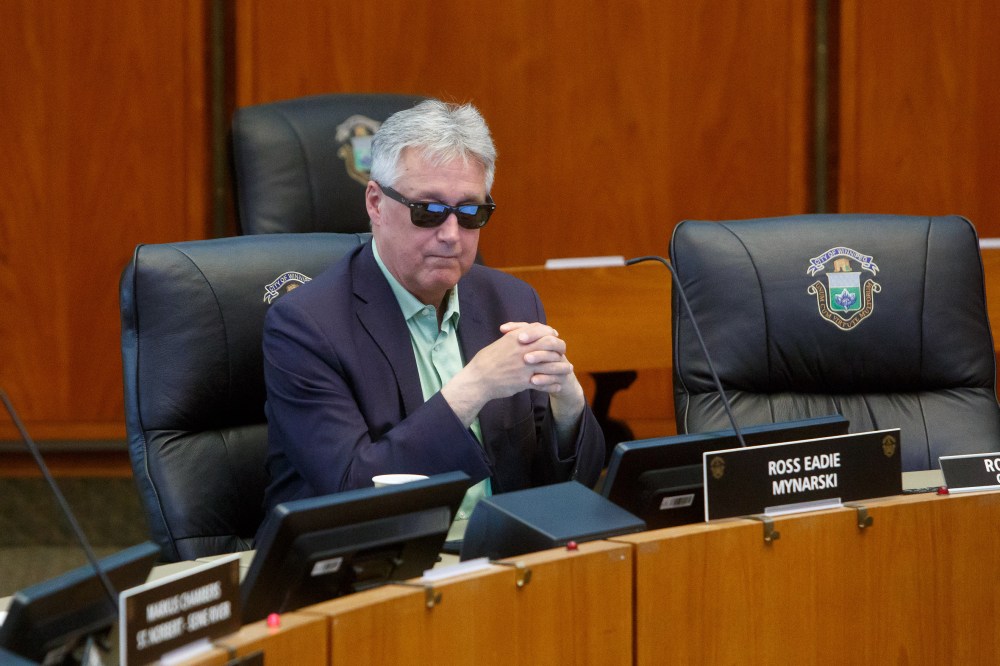Fence tax credit could stop illegal dumping: councillor
Advertisement
Read this article for free:
or
Already have an account? Log in here »
To continue reading, please subscribe:
Monthly Digital Subscription
$19 $0 for the first 4 weeks*
- Enjoy unlimited reading on winnipegfreepress.com
- Read the E-Edition, our digital replica newspaper
- Access News Break, our award-winning app
- Play interactive puzzles
*No charge for 4 weeks then billed as $19 every four weeks (new subscribers and qualified returning subscribers only). Cancel anytime.
Read unlimited articles for free today:
or
Already have an account? Log in here »
A city councillor hopes a financial incentive to support the addition of six-foot fences could help property owners reduce dumping, though others prefer the city ramp up enforcement instead.
Coun. Ross Eadie (Mynarski) wants the city to explore a potential property tax credit program that would partly reimburse residents and business owners for adding fences around their yards.
“Many properties are being abused by owners and renters from other properties dumping solid waste on lots without proper fencing to protect the victims’ properties … this dumping of solid waste is most prominent in low-income areas of the city where owners cannot afford to build six-foot fences around their backyards,” the motion states.

Eadie is calling for staff to complete a report that determines the price to erect sturdy fences around sample 25-foot wide lots, lists neighbourhoods that would benefit from such a credit, and details how such a program could be put in place.
“What this will do is reduce the numbers of properties that bylaw enforcement has to go and tell them ‘yeah, victim, you’re going to have to pay to have all that (trash) removed’ … They’ll get ticketed if they don’t clean the dumped trash up,” he said.
The councillor said the report will determine the size of the credit and which residents should be eligible for it.
Mayor Scott Gillingham said he’ll review the motion before executive policy committee members vote on it next month, though he did have some initial concerns about what it might cost.
While he stressed owners must take care of their properties, Gillingham said he is sympathetic to folks who’ve seen their lots dumped on by others.
“I’d welcome the opportunity to discuss this matter to see if we can find solutions for the illegal dumping problem that we have … I’ve walked with property owners in north Point Douglas areas who have pointed out to me where people have brought a trailer full of construction materials and just dumped it in their community. That’s frustrating, nobody in the city would want that,” said Gillingham.
Some Point Douglas and William Whyte residents said dumping poses a major concern for their neighbourhoods but they fear the tax credit wouldn’t be effective at reducing it.
“I don’t think it’s going to work. I don’t think people are going to take advantage of it … They won’t buy in because of the cost factor, because of lumber being so expensive. I’m sure the tax break would be a very minimal thing,” said Darrell Warren, president of the William Whyte Neighbourhood Association.
Warren said buildings that are boarded up, burned out or have been reduced to rubble piles tend to attract the most dumping.
“There are very few (yards) that are getting dumped (on) behind occupied houses,” said Warren, who urged the city to ramp up enforcement against dumpers instead.
Catherine Flynn, chair of the Point Douglas residents committee, said she fears more fences would hide the problem, rather than solving it.
“These properties really need to be (watched) because they’re fire hazards and, I think, if you put a six-foot fence around it, it’s really just going to stop people from monitoring the property,” said Flynn.
She fears metal fences would also be quickly destroyed by those who steal scrap metal.
Flynn echoed concerns about derelict homes and vacant properties, noting “mountains of garbage” at some lots attract rats and cockroaches, which create further issues. She also believes the city needs to toughen up fines and enforcement.
“What we really need are some illegal dumping cameras, just for starters … (For example) if people see a $1,000 fine on their driver’s licence, they’re not going to be too happy about it,” said Flynn.
She also believes businesses and organizations who dole out cups, cutlery, needles and other single-use items should pay a surcharge for doing so, with the revenue then devoted to cleanup efforts.
joyanne.pursaga@freepress.mb.ca
X: @joyanne_pursaga

Joyanne Pursaga
Reporter
Born and raised in Winnipeg, Joyanne loves to tell the stories of this city, especially when politics is involved. Joyanne became the city hall reporter for the Winnipeg Free Press in early 2020.


